Additional Topics With Rational Numbers
Example 4 Given the sequence, determine whether it
is arithmetic or geometric, find the
common difference or common ratio, and find the next term.
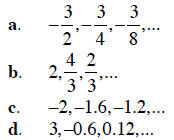
Solution
a. First we need to determine if the
sequence is arithmetic or geometric.
Note that:

So the sequence is geometric and the common ratio is1/2.
The next term is
given by:

b. First we need to determine if the sequence is
arithmetic or geometric .
Note that:
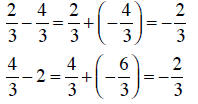
So the sequence is arithmetic and the common difference is
 . The next
. The next
term is given by:

c. First we need to determine if the sequence is
arithmetic or geometric.
Note that:

So the sequence is arithmetic and the common difference is
0.4. The next
term is given by:
-1.2 + 0.4 = -0.8
d. First we need to determine if the sequence is
arithmetic or geometric.
Note that:

So the sequence is geometric and the common ratio is –0.2.
The next term is
given by:
0.12 • (-0.2) = -0.024
We conclude this section with an application of rational
numbers which involves order of
operations.
Example 5 Steve owns 120 shares of a stock which
rises  per share one day, and 250
per share one day, and 250
shares of a stock which loses  per share on
the same day. Did he have a net
per share on
the same day. Did he have a net
gain or loss, and how much was it?
Solution Treating the stock rise as a positive
number and the stock loss as a negative
number, his net gain or loss is given by:

Steve had a slight gain of $13.75 on the day. Note that we
converted to decimals
in the second step , since they are commonly used in our dollar money system .
Terminology
graphing inequalities
geometric sequences
arithmetic sequences
Exercise Set 3.6
Replace the blank with the correct symbol : <, =, or >
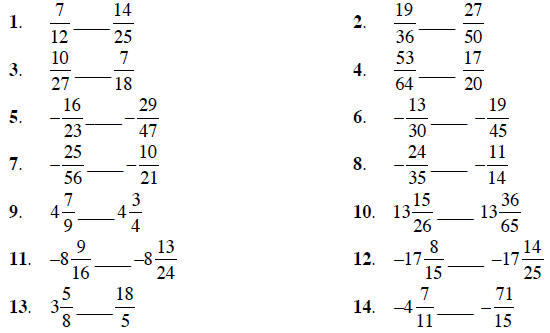

Determine whether or not the given rational number is a solution to the equation .
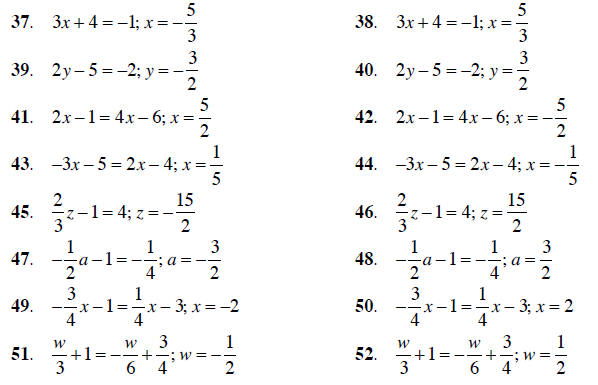
Given the sequence, determine whether it is arithmetic or
geometric, find the common difference
or common ratio, and find the next term.
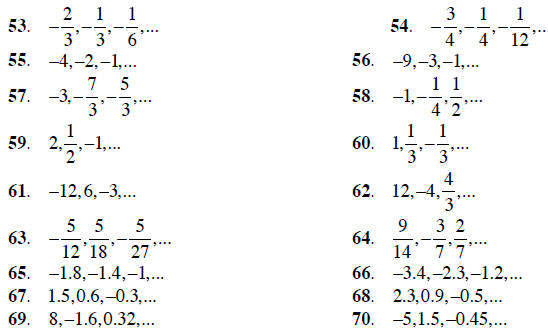
Answer each of the following application questions. Be
sure to read the question, interpret the
problem mathematically , solve the problem , then answer the question. You should
answer the
question in the form of a sentence.
71. Bernice owns 460 shares of a stock which gains
 per share one day, and 320
per share one day, and 320
shares of a stock which loses  per share that
day. Did she have a net gain or loss
per share that
day. Did she have a net gain or loss
that day, and how much was it?
72. Brian owns 360 shares of a stock which gains
 per share one day, and 170 shares
per share one day, and 170 shares
of a stock which loses  per share that day.
Did he have a net gain or loss that day,
per share that day.
Did he have a net gain or loss that day,
and how much was it?
73. Todd signs a two year lease for his new BMW. The lease
requires a $2,450 down
payment and payments of $473.58 per month. What is the total amount he paid for
the
lease?
74. Brad signs a four year loan for his yacht. The loan
requires a $6,500 down payment
and payments of $683.97 per month. What is the total amount he paid for the
yacht?
75. Carol signs a 15 year loan for her house. The loan
requires a $18,760 down payment
and payments of $1,265.49 per month. What is the total amount she paid for the
house?
76. Tracy signs a 30 year loan for her house. The loan
requires a $6,890 down payment
and payments of $732.26 per month. What is the total amount she paid for the
house?
77. Jerry’s walnut trees produce 80 pounds of walnuts per
tree. He plants 50 trees per acre,
and has 86 acres of walnuts. If Jerry is paid $0.67 per pound for the walnuts,
what is
the total revenue from his walnut orchard?
78. During a low production year , Jerry (from Exercise 77)
has a yield of only 62 pounds
of walnuts per tree. However, the price paid for the walnuts raises to $0.84 per
pound.
Will his total revenue increase or decrease? By how much?
79. You commute to (and from) work 218 times during the
year. The distance from your
home to work is 24 miles. If the cost of operating your car is 26 cents/mile,
what is
your cost of commuting during the year?
80. Mary commutes to (and from) work 209 times during the
year. The distance from her
home to work is 8 miles. If the cost of operating her car is 35 cents/mile, what
is her
cost of commuting during the year?
81. Frank’s Cleaners contracts to clean 325 shirts and 130
pairs of pants for one week.
Frank is paid $2.25 for each shirt and $4.25 for each pair of pants. How much is
the
weekly contract?
82. A separate contract with Frank’s Cleaners (from
Exercise 81) is to clean 286 shirts and
155 pairs of pants for one week. If the amount per shirt and pair of pants
remains
unchanged, will this contract be more or less? By how much?
| Prev | Next |